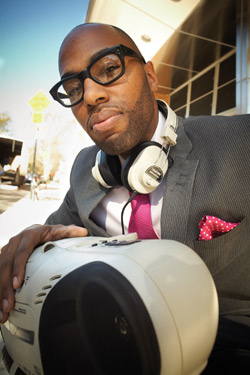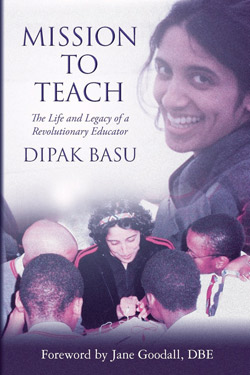"You Can't Teach that Kind of Magic"
Remembering science educator Jhumki Basu (Ph.D. '06) By Christopher Emdin
Sreyashi Jhumki Basu was a New York University professor of science education who died of breast cancer in 2008 at the age of 31. Last year, she posthumously received TC’s Early Career Award. Mission to Teach: The Life and Legacy of a Revolutionary Educator (2013), written by her father, Dipak Basu, tells the story of an impassioned young woman who created math and science programs for under-privileged teenage girls; developed a physics curriculum for high schools in South Africa; helped found a school based on the theme of democracy and leadership; and won a research fellowship to help new science teachers interpret and enact democratic science pedagogy. Her parents have since created the Jhumki Basu Foundation to promote equity in science education.
I can’t talk about Jhumki as a science educator without first talking about her as a friend and a person.
She was the most kind, insightful, creative, yet at the same time most buck-against-the norm kind of person I’ve ever met.
She had such immense passion for what she was doing. She was the first person I’d ever seen bring a motley crew of students to present at a science education conference. And she was the first person I ever saw who, midway through making a scientific presentation, was moved to tears by her material.
As science educators we were kindred spirits. I came to TC just as Jhumki was leaving, but we became instant friends. We attended each other’s research meetings. We talked about our careers. We laughed about the similarities in our work. We were both firm believers in urban science education; we were both conceptual physicists and former physics educators. We had both helped to found the schools where we taught.
When Jhumki passed away, part of what was so painful to me was that she wouldn’t get to see our vision for urban science education come to fruition. We both wanted to showcase youth culture in the sciences; to connect science to the larger realm of engineering, technology and math in ways that come to life; and to empower young people from the inner city to walk the university campus as if they owned it. We both felt that science education could give a voice to the voiceless — to the kids from Brooklyn who have been told they’re not smart, they’re not going to college — and we wanted to create a cadre of new teachers who understand that teaching science in urban settings requires a very special approach and mindset.
People often say that someone they lose was amazing, but with Jhumki it was really true. There are pictures of her coming back from chemo to teach her classes. In the very last email I received from her, she asked me to review a grant she was applying for. That was two days before she died. She fought till the last second, and she never once thought the cancer would defeat her.
Her biggest accomplishment was the lives she touched. The ninth graders she wrote about in her dissertation are now in college. They’re science majors, poets, thinkers. She flew them across the country to her wedding in California — kids from Brooklyn who would never have seen that part of the country, or experienced Indian culture, or glimpsed the world of a scientist.
In 2007, not long after I started teaching at TC, I called Jhumki and told her I was thinking about leaving, because my own sister had been diagnosed with colon cancer. I didn’t know anyone here, and I was feeling the pressure of being at an Ivy League institution. I was thinking that maybe academia wasn’t worth it — that I’d just go up to Buffalo and hang with my sister. That’s when Jhumki told me she had breast cancer and talked me into staying. I’ll never forget that act of selflessness. She said, “You’ll make it here.” She told me that cancer is not a death sentence.
In the end, I lost them both — Jhumki and my sister. But Jhumki gave me my career.
The book about Jhumki gives you a wonderful sense of all the different layers of her life. But it’s also a beautiful book for readers who want to know what makes someone like that tick. Still, there are things about a person you can’t really grasp from reading a book. You can’t teach that kind of magic. You can only retrace the constellation of experiences to see how they gave birth to that kind of a soul.
Sometimes at the end of the day I walk past the plaque in the TC lobby that has the names of all the Distinguished Alumni Award winners. I see her name on it. And I think about how proud I am to have known her.
Published Tuesday, Jun. 3, 2014

